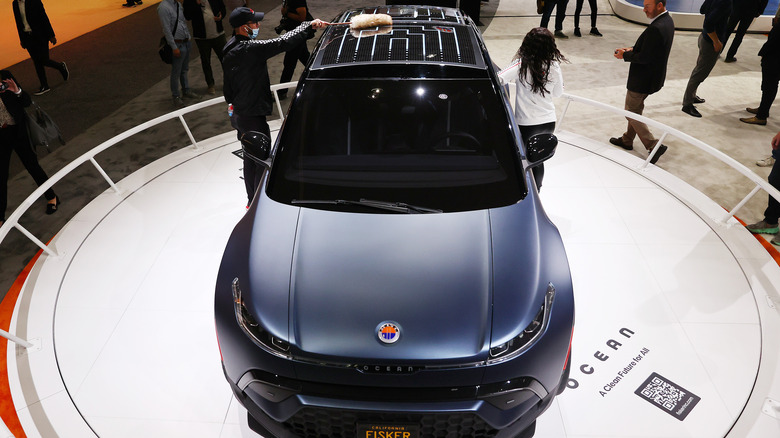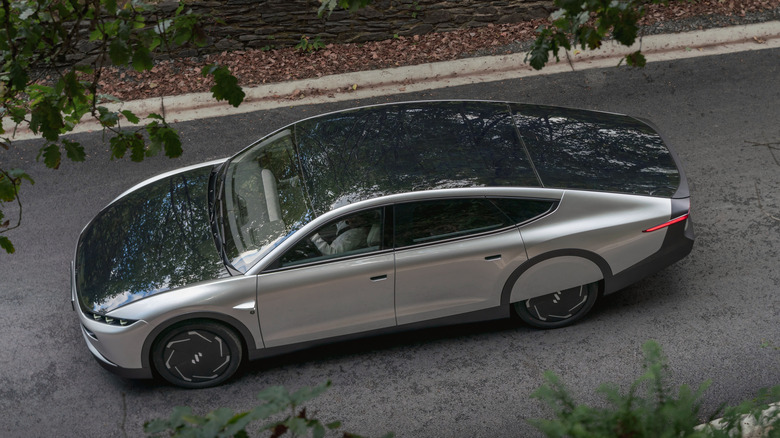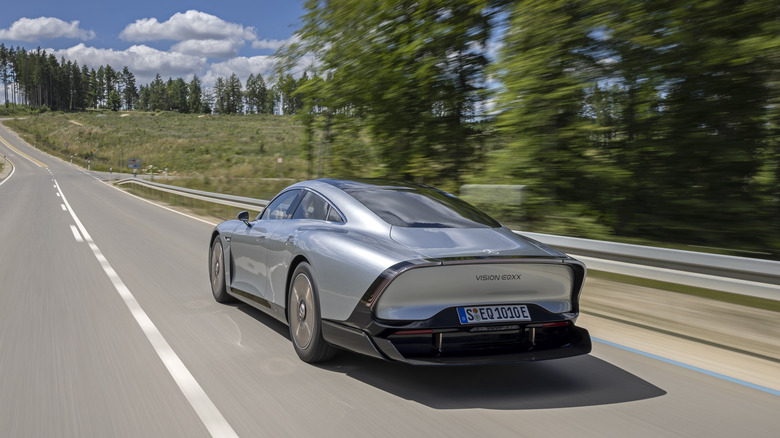Are Solar Roofs The Future For EVs? Here's What The Experts Say
What if you could have a solar roof on your electric vehicle? This means it could park your electric vehicle outside for a few hours, and add a few miles of battery range — as long as there is enough sunlight. Well, it's not a new concept. Toyota installed an optional solar panel on the Prius hybrid to run an electric fan over a decade ago. Other manufacturers like Mercedes Benz and Hyundai have also announced plans to develop electric cars with solar roofs to attract customers who want to save on fuel costs.
Fisker is another automaker that is developing electric cars with solar roofs — and they could be coming soon. However, we've yet to see solar-powered EVs taking over despite the benefits they could offer. The million-dollar question is, are solar roofs on electric vehicles viable? Or are they just a marketing gimmick to capture your attention? Let's find out.
EV solar roofs are expensive
One of the biggest challenges of automakers is keeping the price of their electric vehicles as cheap as possible to have a competitive edge. Automakers like Ford, Tesla, GM, and Honda are working on strategies to cut down their production costs and offer cheaper EVs to drive up their numbers. In addition to that, the Biden administration introduced tax cuts for electric vehicles to increase demand and promote local manufacturing.
The problem is, EV solar roofs are expensive to install — and they don't make your electric vehicle cheaper. "It's obviously still really expensive. We have spent a lot of time on developing it and making it work correctly," Henrik Fisker, the CEO of Fisker told MotorTrend. In fact, Fisker doesn't offer the solar roof on all of its models — it only comes with its most expensive trim, the Fisker Ocean Extreme at $68,999.
But to give credit where it's due, Fisker offers one of the cheapest EVs with a solar roof. Case in point? The Lightyear One solar EV with a solar roof is expected to be sold at around $170,000, and the Humble One will start at $109,000. The Mercedes-Benz VISION EQXX is another cool EV that comes with a solar roof, although its starting price hasn't yet been confirmed.
EV solar roofs are not efficient
According to Engineering Explained in the video above, a car doesn't have a surface area that is big enough for solar panels to harvest enough power to make it viable. Not to mention, the best solar panels right now have an efficiency of between 20% to 25%. Theoretically, if you park a Tesla Model 3 with a high-efficient solar roof under perfect sunlight conditions, it would take 200 hours or 8.3 days to charge its 75-kWh battery to 100%. Even if it would be possible to drive the Tesla Model 3 non-stop while it's only harvesting solar power, you wouldn't be able to go faster than 12 mph.
However, the CEO of Fisker told MotorTrend that the technology could make significant strides in the future. "I think it's a technology that, as we start improving it, maybe in the later stage in some years, we can double or triple the energy. Then suddenly you get to the point where you can do small trips without even using any other power than solar. We are not there yet."
Solar-powered EVs are on the way
The Fisker Ocean Extreme with SolarSky roof is expected to be delivered in 2023. According to Fisker, its solar roof can add 1,500 to 2,000 free miles in a year — that's if you're in locations with consistent sunlight. Similarly, Hyundai Ioniq 5 comes with a solar roof that adds about 1,242 free miles over a year, which is almost close to the Toyota bZ4X solar panel that can add up to 1,118 free miles over the same period. The free miles can make it cheaper to maintain an EV, but the solar roof is still not enough to completely power your electric vehicle on the move.
On other hand, Humble Motors is developing an EV with a solar roof that could generate up to 35 miles on a sunny day. Lightyear is even more ambitious and it promises a solar range of up 43 miles over a single day. However, we can't confirm if Humble One and Lightyear EV will achieve those numbers until they're produced and delivered to customers.
Beyond that, Mercedes-Benz is working on an ultra-efficient solar-powered EV that could add up to 15.5 miles of free range per day — and we took it on a test drive.


